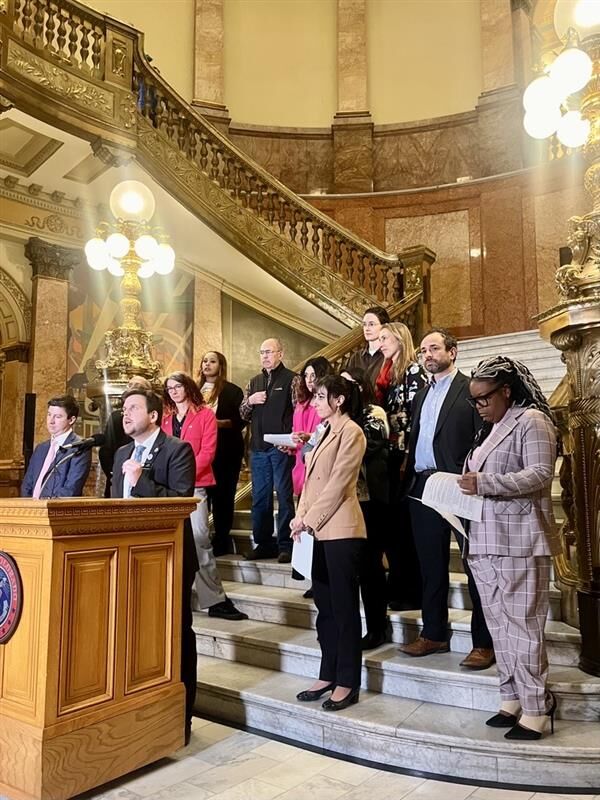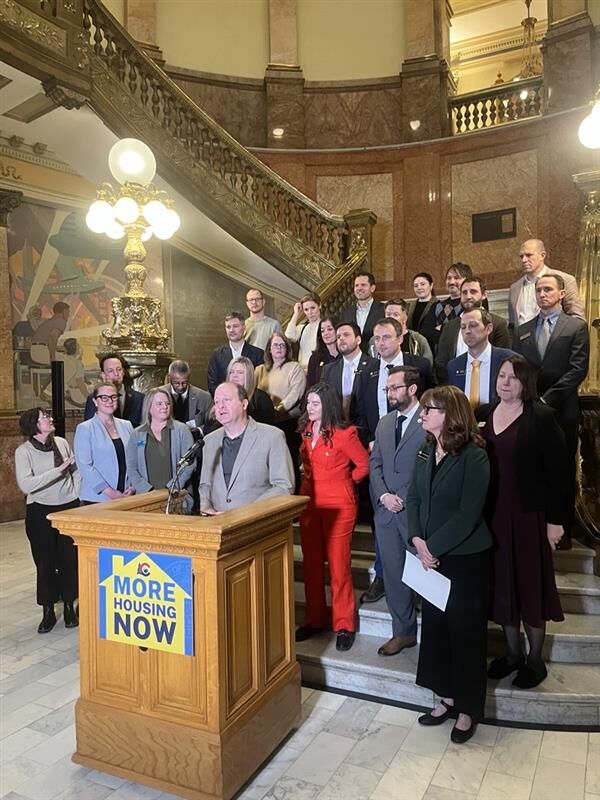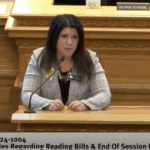Here is how Colorado’s corporate taxes will change

Colorado tax policy currently is “coupled” with federal tax policy. What that means is when the federal government changes tax policy, Colorado’s policy automatically conforms to those changes.
Changes to the federal tax code enacted through H.R. 1 resulted in the state losing $1.2 billion in income tax revenue, Democrats and state analysts said. Republicans have rejected that framing of Colorado’s budget shortfall, insisting Democrats ignored warnings of a looming deficit and kept overspending over the last several years, and, thus, they only have themselves to blame.
That tax “coupling,” in turn, created a roughly $800 million deficit in the current budget, analysts said. Only a handful of states — lawmakers have claimed it’s as few as four — do it the same way.
Mark Ferrandino, director of the Office of State Planning and Budgeting explained there are two areas in which Colorado is tied to changes in federal income tax policy.
The first is known as “rolling conformity.”
When the federal government makes changes to income tax policy, as was the case with H.R. 1., a state can decide whether to conform — and what portions to adhere to.
The second is this: When filling out tax returns in Colorado, a taxpayer starts with the adjusted gross income, then adds federal deductions and credits in order to arrive at the federal taxable income.
That’s the number federal taxes are based on, and it’s also the figure used to file state tax returns.
Other states start with the adjusted gross income but don’t make the adjustments with federal deductions and credits. That leads to a higher adjusted gross income, upon which state taxes are based.
Those two factors combined — rolling conformity and using the federal taxable income calculation — is “why we’re more susceptible,” Ferrandino told Colorado Politics.

Kelly Politte, a tax attorney at Hall Estill, Denver, who focuses primarily on federal and state tax matters, told Colorado Politics one of the biggest changes from H.R. 1 is to expand a research credit that corporations can take, which lowers their taxable income, and which then reduces Colorado’s taxable income.
The law also extends a child care tax credit on the individual side, and that, too, lowers the federal taxable income, as well as the Colorado taxable income, noted Politte, who specializes in IRS and state tax issues.
One of the bills in the special session that directly applies to H.R. 1 is House Bill 1001, which deals with qualified business income deduction “add-backs.”
That deduction was supposed to expire at the end of 2025; H.R. 1 extended it permanently.
HB 1001 appears to decouple Colorado from that federal change, Politte said.
It reverses the H.R. 1 state revenue loss from the qualified business income deduction “add-backs.” That is, the bill requires certain taxpayers to “add back” an amount equal to their federal deduction for qualified business income for purposes of determining state taxable income.
Those taxpayers include sole proprietors — individuals who own their own business outside of a legal framework, S corporations, estates and trusts, and partnerships.
HB 1001 won final approval from the Senate Monday and now heads to the governor. It would add $45.9 million to the state’s general fund.
Republicans throughout the special session have claimed that the tax bills all violate the Taxpayer’s Bill of Rights, warning of lawsuits.
Already, Michael Fields of Advance Colorado said on X his group would add any violations of TABOR arising out of the special session to a lawsuit filed in July over the legislature’s decision to tax overtime pay.
Another measure, House Bill 1002, also has a nexus to H.R. 1.
The bill, which deals with corporate income taxes related to foreign jurisdictions, creates an addition to the state taxable income of corporations equal to the federal deduction for foreign-derived deduction-eligible income (FDDEI).
HB 2 won final Senate approval on Sunday and is headed to the governor for signing.
It would bring in $35.6 million in the 2025-26 budget year.
The countries being add to a list of “tax havens” are Hong Kong, Ireland, Liechtenstein, Netherlands, and Singapore.
Under the bill, the state Department of Revenue would require a corporation to prove it is incorporated in a “listed jurisdiction” for economic reasons, instead of for avoiding paying taxes.
Along with HB 1001, it would generate $81.5 million for the state.
Meanwhile, House Bill 1003 eliminates a premium tax rate reduction for insurance companies with home offices in Colorado.
Currently, insurance companies pay 2% of their premiums to the state, although if they have a home office in Colorado, that becomes 1%. That rate reduction is intended to encourage employment in Colorado.
It hasn’t worked out that way, said Democratic lawmakers.
HB 3 would eliminate that 1% reduction, raising $44.1 million in 2025-26 and $91.1 million in the next fiscal year.
HB 3 received final approval from the Senate and also now heads to the governor for signing.
The three bills, assuming the estimates are correct, would bring in $125.6 million.
Additionally, House Bill 1005 eliminates the state’s vendor fee.
Currently, retailers who collect state sales tax on behalf of the state are allowed to keep a portion of that sales tax as payment for their efforts to remit those state sales taxes. Democratic lawmakers argued that the process is much simpler and more automated than it was when the vendor fee was added to state law in 1935.
HB 5 would raise $27.6 million in 2025-26 and almost $57 million in the next fiscal year.
HB 5, along with the four measures, would bring in $153.2 million.
The bill with the biggest impact on the budget shortfall is House Bill 4, which deals with sales of tax credits.
HB 4 would allow C corporations to purchase state tax credits from the Treasury Department that would give them a discount on their tax liability. The state could raise $100 million from the sale of those credits.
All the bills would bring in a total of $253.2 million — and that’s how lawmakers intend to “solve” a third of the budget deficit.
Policymakers have coalesced around the idea of solving the second third of that deficit by tapping the state reserves and the rest by making cuts, which they’re asking Gov. Jared Polis to figure out where and how.













